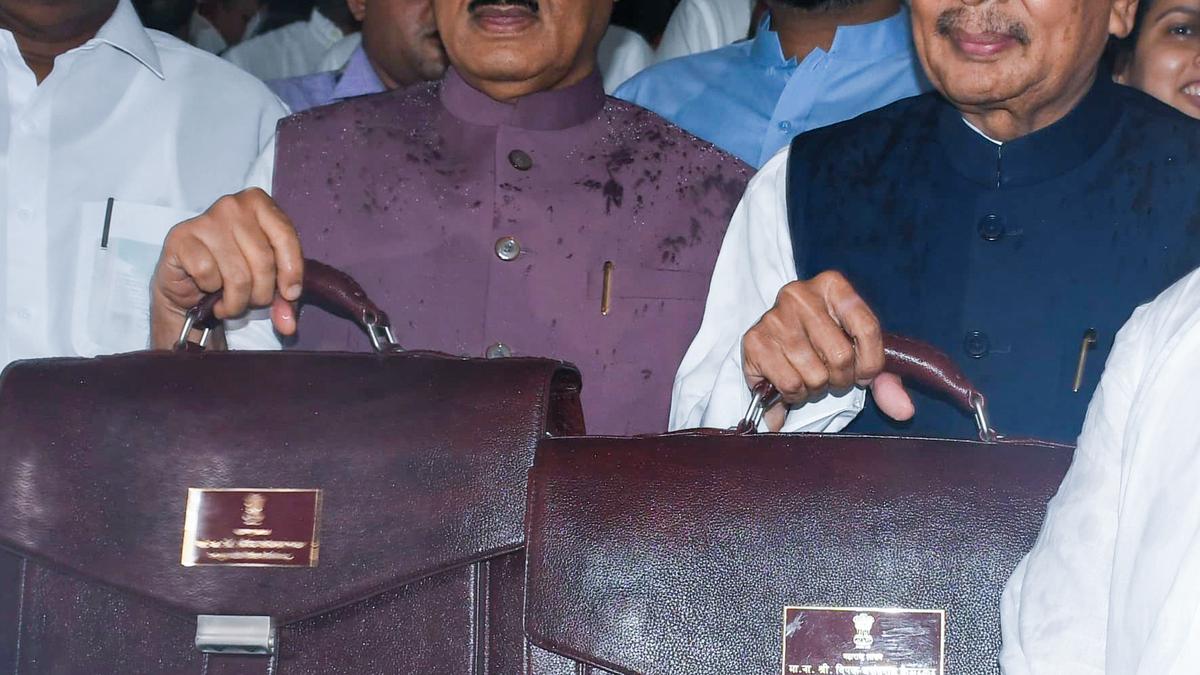Maharashtra Finance Minister Ajit Pawar and Minister of State Deepak Kesarkar display 2024-25 Budget bags on the 2nd Day of the Monsoon Assembly Session, at Vidhan Bhavan in Mumbai,
| Photo Credit: ANI
The budget presented by the Mahayuti government in Maharashtra last week ahead of the upcoming Assembly election reflects the outgoing dispensation’s attempts to balance or at least project a semblance of social engineering with populist schemes.
With an allocation of ₹6,12,293 crore for the current fiscal, the budget underscores the tripartite government’s intention to strengthen its support base among various sections.
A key aspect is the grant of 20,000 to each Dindi, a religious procession of Lord Vitthala to Pandharpur on every Ashadhi Ekadashi, demonstrating gratitude to the Warkari community, which holds significant influence in rural Maharashtra, making this a calculated move to secure their support.
Targeting ‘silent’ voters
The introduction of the Mukhya Mantri Majhi Ladki Bahin, based on neighbouring BJP-ruled Madhya Pradesh’s popular Ladli Behna Yojana, aims to support women by providing a monthly allowance of ₹1,500 to eligible women aged 21 to 60. It also announced Mukhya Mantri Annapurna Yojana to provide three free LPG cylinders a year for a family of five. These are seen as a direct appeal to women voters, particularly in the rural and semi-urban areas, who are considered ‘silent’ yet crucial voters.
The budget also promises several populist measures, including a waiver of power bill dues for 44 lakh farmers, 15 per litre subsidy to dairy farmers, Gaon Tithe Godam (godown in every village) to provide storage facilities for agricultural produce, and subsidy to onion farmers.
These measures are tailored to address the grievances of the agrarian community, which has expressed dissatisfaction with the government’s pol-icies. The allocations indicate an attempt to win back support of the farming sector, a critical voting bloc in Maharashtra.
Earlier this year, Finance Minister Ajit Pawar presented an almost similar vote-on-account budget with several ‘bumper schemes’ ahead of the Lok Sabha poll. Despite those efforts, the ruling alliance won only 17 out of the 48 seats, while the Maha Vikas Aghadi, comprising Congress, Shiv Sena (UBT) and NCP (SP), won 30 seats. Ahead of the Assembly poll, the Mahayuti has gone all out to appeal to key segments of the population farmers, women, youth, devotees, and marginalised groups – through budgetary allocations aimed at building a broad social coalition.
Opposition leaders, however, criticised the budget as ‘political hypnotism’ and a ‘torrent of assurances’ designed only to sway voters before the poll.
In addition to these schemes, Chief Minister Eknath Shinde, a day after the budget, announced Mukhya Mantri Teerth Darshan Yojana, a new pilgrimage scheme for senior citizens of all religions.
Ambiguity over funds
Though budget promises abound, concrete implementation strategies and fiscal prudence are lacking, as there is insufficient clarity on funding for the schemes. This ambiguity raises concerns about the feasibility and sustainability of the promises.
Whether this strategic social engineering will overshadow the issue of the split in Shiv Sena and NCP as well as the ongoing rift between Maratha and OBC communities, and translate into electoral dividends for the ruling alliance remains to be seen.







